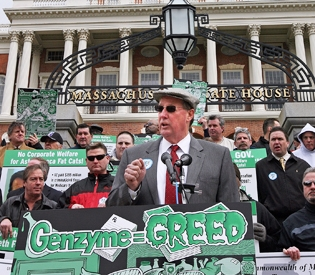Union Corporate Campaign for Biotech Project Labor Agreement in Massachusetts
On 5/1 I wrote about how Virginia Building Trades Unions were running a corporate campaign against Dominion Virginia Power for more union jobs and (likely) a PLA.
The Massachusetts Building Trades have taken a corporate campaign against companies in Massachusetts’ Biotech industry to a whole new level with this absurd StopBiotechLooting.org website, media campaign and political theatre staring Mass. Gov. Deval Patrick.
Mass. construction unions are upset that Mass. Biotech construction projects have not been built exclusively with union labor via PLAs so they have turned to aggressive PR tactics and support from political cronies to advance their agenda. But unions are getting Biotech work according to a Massachusetts Biotechnology Council spokesman, its just not a union monopoly.
The Massachusetts Biotechnology Council says its companies are willing to consider union bidders, but won’t be held captive to what the trade group calls the union’s “narrow interests.” A Genzyme spokesman says his company uses a mix of union and nonunion labor at the project in Framingham. And a spokeswoman for Rockland-based EMD Serono says she expects a significant percentage of her company’s Billerica work will go to union contractors.
Today the South Coast Today published this excellent Op-Ed by ABC Massachusetts President Greg Beeman about Big Labor’s disruptive antics against Biotech firms and other local projects that were built using free and open competition.
YOUR VIEW: Bad for Fall River?
Op-Ed By GREG BEEMAN
Greg Beeman is president of Associated Builders and Contractors of Massachusetts, a construction trade association headquartered in Burlington.
May 05, 2009 6:00 AM
Last fall, construction unions welcomed the opening of a Genzyme Science Center in Framingham with pickets, an inflatable 9-foot rat and a plane that towed a sign with the address of a Web site attacking the company.
More recently, they’ve mounted a “Stop Biotech Looting” campaign that includes radio ads, picketing Massachusetts Biotechnology Council (MBC) events and disrupting a permitting meeting for one planned facility.
These examples have one thing in common: the targeted companies refuse to guarantee they will use only union labor on their construction projects. Instead, they conduct open bidding processes that invite participation from both union companies and those that have chosen not to affiliate with the unions.
Sadly, Gov. Deval Patrick has sided with the construction unions. He recently surprised members of the Biotechnology Council when he strode in to give the keynote address at the group’s annual meeting flanked by a dozen union leaders.
“One in five unemployed people in this state work in construction,” Patrick said. “These people do not feel they’ve been given a fair shake by this industry, and that has to change.”
One in five is not just the portion of unemployed in Massachusetts who work in construction. It also happens to be exactly the fraction of the commonwealth’s construction work force that belongs to a union.
The union leaders behind these attacks claim that economic development is supposed to be for everyone, including working people. Why, then, do they seek to shut out the vast majority of construction workers?
As MBC President Robert Coughlin noted, over half the jobs on the commonwealth’s biotech construction projects are union. But the union minority will settle for nothing less than a monopoly in Massachusetts.
Now the unions are trying to shut down construction of 166 desperately needed affordable housing units in a long-abandoned mill building in Tiverton, R.I., just across the border from Fall River. They call the project “bad for Fall River” and make all the usual allegations of political cronyism, exploitation of illegal immigrant labor and violating other state labor laws.
True to form, they provide no evidence for any of it. Open shop contractors and their employees have produced award-winning work in biotech, housing development and other key markets. The employees receive good wages, benefits and training. Once again, the real issue is a contractor who refuses to give in to the unions.
General contractor Dellbrook Construction does have union subcontractors working on the site. They got the job because they were the lowest qualified bidders in an open, competitive process.
But open bidding isn’t good enough for construction unions, and a recent example from Fall River explains why.
In 2006, the city decided to build several new schools using a project labor agreement, which guarantees the use of exclusively union workers. After bidding and re-bidding the projects, prices were so far above budget that then-Mayor Edward Lambert decided to put the schools back out to bid without a PLA. The difference was dramatic.
Despite rampant oil price-driven construction inflation during the months between the first round of bids under a PLA and commencement of the open bidding process, subcontractor bids fell by 13 percent on one project and 15 percent on another. On one of the projects, the number of subcontractor bids rose from 34 to 60.
No wonder biotech officials claim union pricing is too high and that the unions are unwilling to negotiate, even in the current economy.
Construction unions are asking for much more than a “fair shake.” Despite representing a small minority of the marketplace, they want a monopoly on construction work in Massachusetts.
In trying to get that monopoly, they send a loud and clear message about the business climate in our region. If that message is heard, all of us – including the unions – will be the losers.












